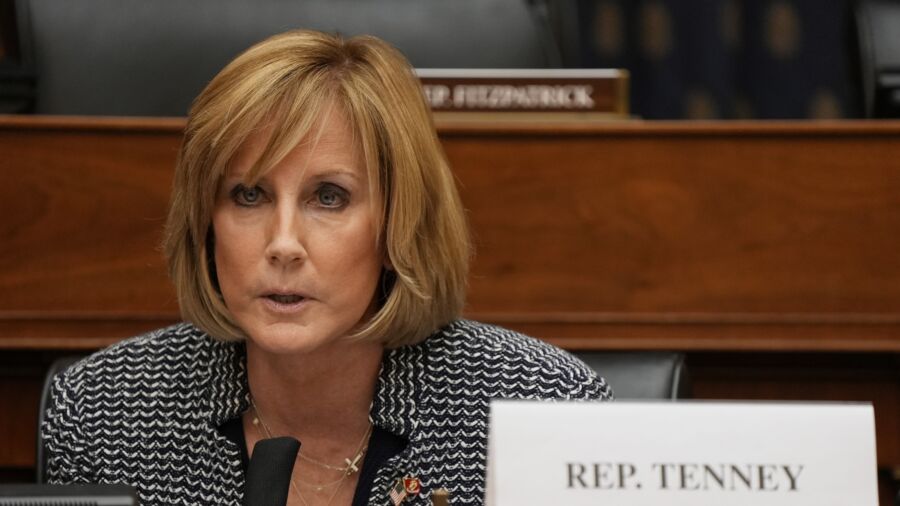Congresswoman Claudia Tenney (R-N.Y.) has reintroduced a bill to prohibit tax-exempt organizations from donating to election bodies after institutions linked to billionaire Mark Zuckerberg funneled hundreds of millions of dollars toward such election offices in 2020.
“In the 2020 election, Mark Zuckerberg, under the guise of the Center for Tech and Civic Life (CTCL)—a liberal non-profit group—flooded left-leaning county governments in Texas, Ohio, Nevada, Minnesota, Georgia, Florida, Arizona, and Pennsylvania with opaque private funding to influence election administration for their own purposes,” Tenney wrote in a Wednesday press statement.
“CTCL used this money as leverage over cash-strapped election agencies, forcing them into advancing its own partisan agenda. Millions of dollars from Zuckerbergs’ wallet flooded the field under the guise of ‘making voting safer amid the pandemic,’ yet less than 1 percent of those funds were spent on PPE, and 92 percent of the funds went to left-leaning districts,” Tenney added.
Critics have described the money Zuckerberg allegedly channeled to election offices in predominantly left-leaning districts “Zuckerbucks” or “Zuckbucks.” Tenney borrowed the term for the title of a new bill she introduced on Wednesday, called the “End Zuckerbucks Act” (pdf).
Tenney’s bill would specifically amend the Internal Revenue Code to prohibit 501(c)(3) tax-exempt organizations from directly funding official election organizations through donations or donated services. Tenney introduced the bill with co-sponsoring Representatives Elise Stefanik (R-N.Y.), Tom Tiffany (R-Wis.), Scott Fitzgerald (R-Wis.), Lauren Boebert (R-Colo.), Tom Cole (R-Okla.), Barry Moore (R-Ala.), Ralph Norman (R-S.C.), Mary Miller (R-Ill.), Dan Bishop (R-N.C.), Paul Gosar (R-Ariz.), and Bill Posey (R-Fla.).
Tenney introduced a similar bill opposing the so-called “Zuckerbucks” practice in June of 2021, but the bill never moved beyond its initial introduction in the then-Democrat-controlled House of Representatives. The bill stands a better chance of advancing now that the Republicans control the House, but will likely face tougher opposition in the Democrat-controlled Senate.
Lawmakers working at the state level have successfully passed similar bans on private donations to election offices. In April of 2021, Arizona lawmakers passed legislation banning private donations to state election officials. Florida lawmakers passed similar legislation in May of 2021.
NTD News reached out to CTCL for comment on Tenney’s new legislation, but the organization did not respond before this article was published.
Grants Allegedly Tilted 2020 Election Outcomes
Mark Zuckerberg and his wife, Priscilla Chan, reportedly donated about $419.5 million during the 2020 election cycle. That money included $350 million to CTCL’s “Safe Elections” project, and $69.5 million to the Center for Election Innovation and Research.
Critics have argued that CTCL’s preference toward left-leaning districts was intended to drive voter turnout in Democratic strongholds while making much less of an effort to drive turnout in Republican districts, resulting in an imbalance that favored the Democrats during the 2020 election.
The Thomas More Society’s Amistad Project brought lawsuits over $6 million dollars CTCL gave to officials in Fulton County, Georgia, and five cities in Wisconsin. The lawsuits alleged the funding in Georgia was used to pay “ballot harvesters” and political activists to manage ballots. It also said the money was used to consolidate counting centers in urban areas to move “hundreds of thousands of questionable ballots in secrecy without legally required bi-partisan observation.”
Amistad Project Director Phill Kline told The Epoch Times that CTCL’s practices may have violated the “Equal Protection Clause” in the 14th Amendment of the U.S. Constitution.
Last year, a report (pdf) by special counsel appointed by the State of Wisconsin allegedly found evidence indicating that CTCL’s election grants violated Wisconsin law prohibiting election bribery. CTCL disputed the Wisconsin special counsel report’s findings in comments to NBC 15 last year, saying the report rehashed claims in lawsuits that have already been dismissed.
Zuckerberg Discontinues Election Grants
Last year, former Zuckerberg spokesman Ben LaBolt said Zuckerberg and Chan’s donation to CTCL was a “one-time donation” to “help ensure that Americans could vote during the height of the pandemic.”
LaBolt, who was previously spokesman for Barack Obama’s 2008 presidential campaign and is the current White House Communications Director, said the billionaire couple has “no plans to repeat that donation” in future elections.
While Zuckerberg indicated that he had no plans to resume election-related donations to CTCL, the organization announced last year that it had launched a new, five-year, $80-million program called the U.S. Alliance for Election Excellence to assist election offices across the United States.

